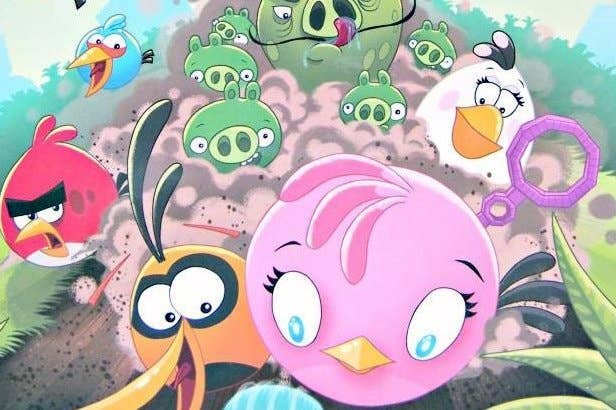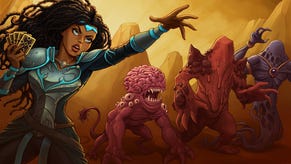Rovio: Leading the way on gender balance
With Angry Birds Stella, Rovio is taking inclusive game development seriously
During the E3 Expo last June, Ubisoft announced that there would be no playable female characters in Assassin's Creed Unity. It must have seemed like such an innocuous decision to Ubisoft that it was announced quite casually, with a minimum of fuss, but on this occasion the public reaction was ferocious. Ubisoft's initial explanation that it was a matter of cost vs. benefit simply didn't cut it. A few years ago, that sort of decision would not have been met with such outrage but, as Ubisoft discovered, times have changed.
Thanks to the efforts of Nintendo and the boom in mobile and social gaming, it can no longer be said that males are the dominant gender in the marketplace for games. However, the response from publishers hasn't always been impressive, often manifesting as separate products for women on the side of male-focused productions - games in specific genres, characters wearing specific colors, and played out with simplified mechanics. Women remained a niche despite the clear potential for this new wave of casual gamers to become more engaged with the medium and seek out different and more challenging experiences. The economic decision to neglect female consumers in a mainstream game is neither understandable nor acceptable anymore, and yet the problem persists.
"We are always trying to hire the best talent with a match on the personality side as well. We've always wanted to be as diverse a company as possible"
Niklas Hed, Rovio
Our very own Rob Fahey pointed to the number of high-level decisions that are still made by men as a significant contributing factor. The IGDA has claimed that, as of 2014, women comprise 22 per cent of the total games industry workforce. That is more than double the ratio from 2009 - a major improvement, but at less than a quarter it's still far from ideal. Moreover, when looking at leadership and executive roles, women have far less representation than at lower levels. This sort of imbalance is true in many other industries, of course, but it's all the more blatant in games than elsewhere.
Fortunately, there are exceptions that are leading the way towards a more inclusive future, proving that an alternative is possible and tenable. Today I'd like to focus on one of them in particular: Rovio Entertainment.
In December 2009, when Angry Birds first hit Apple's App Store, Rovio employed 18 people, most of them men. In focus groups sessions, however, women and children were always included, as it was Rovio's clear intent to remain true to "E for Everyone" - a "four quadrant brand," as Hollywood calls it. Angry Birds' blend of physics, humour, destruction and cute character designs appealed to both genders, to the point that the split among Angry Birds players is 50 per cent male, 50 per cent female.

As a natural consequence of its flagship product, the number of job applications Rovio received from women was almost on par with men - highly unusual for a game developer. Furthermore, in 2011, shortly after the launch of Angry Birds Rio, Rovio took the important decision to reposition itself as an entertainment company rather than merely a game studio. Rovio set out to build a Consumer Products division and an Animation department, two sectors that have had a more equal gender balance for decades. The company also established a Books department, hiring its first female vice president to run it: Sanna Lukander, formerly of Tammi Publishers, the third biggest publishing house in Finland.
Sanna beefed up her team with former employees and colleagues, quickly shaping the first division of the company in which the vast majority of employees were women. Rovio's founders, Niklas Hed and his cousin Mikael, could have resisted, consciously or unconsciously, the influx of women into the company. But being of Finnish upbringing, it seemed natural to them to embrace it instead. It so happens that in Finland - and in Scandinavian countries in general - gender equality is a part of the culture. There is a high number of female CEOs in Finland, and a high number of women at key power positions in politics, including the President. They were raised to choose the best candidate, no matter the gender, and so they did.
Rovio Founder Niklas Hed explains, "We are always trying to hire the best talent with a match on the personality side as well. We've always wanted to be as diverse a company as possible - that's the way to ensure that our games are suitable for all audiences. Probably when you start having more females in the company it encourages more to join in."
As the business grew, Rovio had to expand its Marketing and Communications department to keep up with the growing number of business proposals and opportunities. More women joined the company in positions of high responsibility as a direct result. Marja Konttinen started as an account manager and, after acting as one of the two project managers on Angry Birds Space, she was promoted to head of business development. Saara Bergström moved over from Nokia to lead Rovio's consumer engagement, and eventually became its head of marketing. When Bergström left Rovio to join Helsinki start-up Next Games, her successor was also a woman, Blanca Juti. So is Sara Antila, communication director since 2012, and Rachel Webber, who joined from Tumblr to lead the Animation division.
"Today there are more women joining the gaming industry, which is a good thing for our goals and I would personally like to see a 50/50 gender split"
Niklas Hed, Rovio
Rovio currently employs almost 900 people worldwide, a third of them female. Even more laudable, from VP, SVP, EVP, C-level people and higher executive positions, around one third of positions are filled by women as well. Founder Niklas Hed says, "All in all, today there are more women joining the gaming industry, which is a good thing for our goals and I would personally like to see a 50/50 gender split."
However, when focusing exclusively on Rovio's games unit, things look less rosy, with only about a fifth of the employees being female. With artists and designers the proportion of women is higher; with developers - including programmers and QA engineers - it's lower. Like most game companies, Rovio has long suffered from gender imbalance in development positions. It is a harsh reality of the market that there are fewer female coders out there than male, but Rovio has vowed not to sit idle in the face of that reality.
Rovio's efforts go beyond their own walls. It has vowed to increase the amount of female software engineers in the world at large, and they are taking several long-term steps to make it happen. There is a book, Futuremakers, written by Tuuti Piipo, which will be released as part of the Rovio Visions line later this year. The target of Futuremakers is to give young girls a panel of female role-models to whom they can look for inspiration. As part of its "Fun Learning" initiative, Rovio is also working on games that teach children the logic of code, and they are adamant about making young girls a priority target for this.
Speaking with Mighty Eagle Peter Vesterbacka last December in Rovio's Espoo headquarters, he was clearly very proud of an Angry Birds themed game about teaching code logic. While showing me how the game works, Vesterbacka said, "It is very important to me because I have a little daughter. The other day, I was showing her the game and to see her understand the logic of code was really awesome."
Like the team that designed it, the original flock of Angry Birds was mostly male. The sole exception was Matilda, the white bird that drops eggs when you tap the screen. In August 2012, a second female bird was introduced in the Angry Birds universe. Her name: Stella, who was designed to be an explicitly female character, and was introduced for the first time in the "Back to School" update of Angry Birds Seasons.
In January 2013, CEO Mikael Hed extended a challenge to the Operations team. He wanted to see another division take on building a brand, so that it wouldn't just be the Games team steering the ship. Naz Cuevas, Rovio's global head of consumer products and licensing, accepted the challenge and pitched to upper-management the idea of building Angry Birds Stella into its own franchise, under the code-name "Pink on Purpose."
"Right now, the Angry Birds demographics are 50 per cent male, 50 per cent female. So it's unisex," Cuevas said when we met at Rovio's HQ. "Female customers are used to adjusting to unisex products. It's not necessarily made for us, but we [women] make it work. Yet if we make products that are specifically designed for the modern woman, it passes the message that 'We care.' Angry Birds Classic will still be for everybody. However, to really create a franchise, you need to tailor the brand to target different demographics."
Over time, Angry Birds Stella was nurtured by all of Rovio's departments, each adding extra nuances and subtleties. The games team, the animation division, and the entire brand department, from marketing and communication to consumer insight representatives, they all participated week after week, for over a year and a half, in order to build upon the original vision.
"With CPL [consumer products licensing] and Games leading the way hand in hand, the Books & Publishing unit stepped up in a huge way to seed Stella and build a robust lineup to help continue tell her story," Cuevas said.
And it's not just Stella anymore. Stella now has a flock of BFFs, five female birds and one male who likes to hang out with the girls. Beyond the game, Angry Birds Stella will be fleshed out into its own complete universe, with its own full 52-episode animated series and a full array of consumer products, all designed with the specific tastes of young girls and young women in mind.
The announcement of Angry Birds Stella in February wasn't met with unanimous praise from the press. There was criticism in a couple of editorials here and there, most notably from TIME Techland, which expressed concern over clichés and "pinkified ghettos."
However, while explaining the positioning of Angry Birds Stella, CMO Blanca Juti was quick to point out that the new spin-off is aiming for exactly the opposite : "While it's true that it's designed to talk to modern girls and women, we are creating a brand that aims to talk to everyone, but brings strong female characters to the fore."
"If we make products that are specifically designed for the modern woman, it passes the message that 'We care'"
Naz Cuevas, Rovio
Peter Vesterbacka also rebuffed those claims when he took the stage at SXSW in March: "It's not Angry Birds for girls, but if you look at how boys and girls play, there's a lot more social gameplay in how girls play together. So one theme is that there are differences in how boys and girls play, and that's just how it is. We will try to create an experience that will be fun for everybody, just like all Angry Birds games, but maybe some of the gameplay patterns will be more attractive to a female audience. It's way too simple to say it's just Angry Birds for girls though: we are not into enforcing these stereotypes."
Stella is not a princess and she doesn't need rescuing. Stella is pink like the protagonist of Orange is the New Black is blond - one can only discern so much on hair colour alone, or feather colour, for that matter. The fact that there is controversy about the positioning of Angry Birds Stella will not discourage Rovio. This is one company that ensures that female voices are heard, and the project leads and VPs listening in, talking back and meeting the audience halfway are also all women. This, in and of itself, is a swift move away from the traditions of the games industry, when so many products were created by men for a male target audience. Angry Birds Stella represents a sincere attempt by Rovio to address that imbalance, and the same can't be said about all game companies.
In the face of change you can resist and fight back, or embrace it and lead. The latter option is more worthy, and very often more lucrative. It is a reality that, today, women are playing games in greater numbers than ever before, and not only in genres that are stereotypically associated with their gender. Products like Angry Birds Stella are an excellent start, but even opening up the typically masculine world of AAA games to this huge and growing audience isn't that difficult. It is simply a matter of making that extra effort to be more open-minded and inclusive, from the first day of production to the last.
"If you build it, they will come" applies to both genders.








